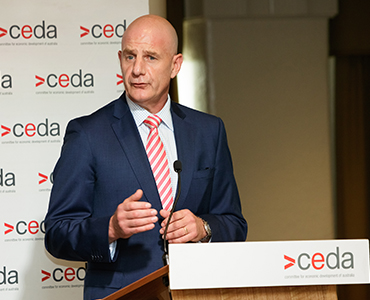The Tasmanian Government is firm in its position that it will not seek to override the existing agreement with the Federal Group that provides them with a gaming monopoly in Tasmania until 2023 at the earliest, Tasmanian Treasurer the Hon. Peter Gutwein has told a CEDA audience.
 “This would have created a climate of sovereign risk and we’re not in the business of tearing up contracts,” he said.
“This would have created a climate of sovereign risk and we’re not in the business of tearing up contracts,” he said.
“It also needs to be placed on the record very clearly that the Federal (Group) have been good corporate citizens and have invested and provided jobs for Tasmania over the period they have been operating casinos and gaming in this state.”
Speaking at the Hobart release event of CEDA’s EPO report, Mr Gutwein said there had been strong interest on gaming licences since the recent proposal of a new casino.
“This coming year will be a significant one in relation to the future of gaming licences in Tasmania post 2023,” he said.
“I expect the government will be in a position to make a more detailed public statement within in the next six weeks.
“In the coming statement we will set out our views on key policy matters for the post 2023 environment such as exclusivity, harm minimisation, the future processes for awarding gaming licences and also the option of the MONA high roller casino so that all stakeholders have an understanding of the governments preferred positions.
“There will be an open and transparent process established to enable stakeholders the opportunity to voice their views on the policy framework that we will outline.
“This will provide an opportunity to have these policy issues tested and to help inform the finalisation of the government’s approach to gaming post 2023.
“I anticipate this process will be undertaken and finalised in 2016…ahead of the 2018 state election bearing in mind that the earliest opportunity for a government to make changes to the current arrangement is 2019 with implementation from 2023.”
Also speaking at the Tasmanian EPO event was Mondelez International, Managing Director, Australia and New Zealand, Amanda Banfield.
Ms Banfield said using local advantages was supporting company growth.
“We’ve found…it’s much more important for us to focus on the local advantages that can really set us apart and see those as a means…to drive differentiation and growth,” she said.
“We’re trying to…operationalise innovation across our total business and think about it not just as a process that operates in the product space, but take that much more into our total operation, into the supply chain and beyond, to find ways of…doing things better and frankly to reduce our cost space as well as drive growth.
“Alongside innovation… you’ve got to have a great talent pool to be able to take that innovation and drive it across the business.
“Australia’s talent pool is perhaps somewhat underrated by ourselves and in the local narrative currently.
“It does feel as if we’ve focused a lot on everything that we’re worried about within education be that funding, STEM, are we getting a good enough return for example from the investment that we’re putting into primary research.
“We believe if you truly want to have an innovative culture, the best way to create that is actually to have diverse…start points and approaches to problem solving.
“So we’re really focused on diversity, with a particular focus first of all on gender diversity.
“Locally we’re having a lot of success.
“In our Australian business we’re sitting at around 40, 41 per cent female representation but we do have pockets where it’s not so good.
“In manufacturing for example, we’re down at about 38 per cent. And I think this does point to an opportunity for Australia in areas where we could be doing better.
“For example at the last count of engineering graduates 16 per cent were actually women.
“If we think about the skills we’re going to need, if we’re really to unlock this innovative fuel for extra growth, I would say that’s an area we really do need to address.”
Commonwealth Bank of Australia, Senior Economist, Michael Workman, discussed the economy and markets at the start of 2016, including insights to the Chinese economy, the transitioning Australian economy and future income opportunities.
Speaking on Tasmania, Mr Workman said that tourism was a big income opportunity for Tasmania.
“Tourism is the fastest growing sector in the world economy by a long shot,” he said.
“Tourism from China is 38 per cent higher now than what is was in 2014 and that’s for Tasmania…This indicates something that is very important for Australia in the future, and that is not only to sell goods and things to people, but also experiences.”